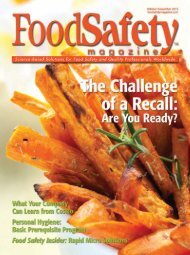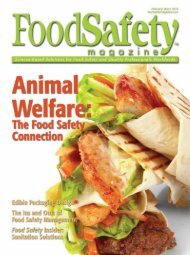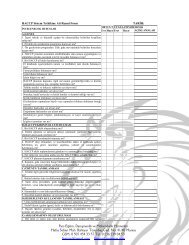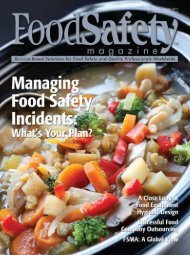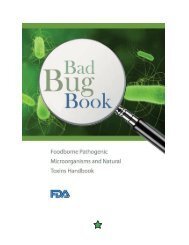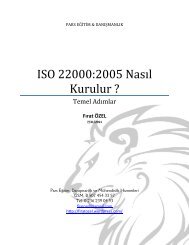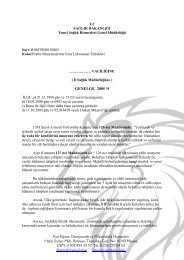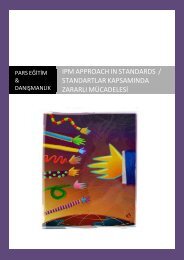Food Safety Magazine, February/March 2012
Food Safety Magazine, February/March 2012
Food Safety Magazine, February/March 2012
You also want an ePaper? Increase the reach of your titles
YUMPU automatically turns print PDFs into web optimized ePapers that Google loves.
What GFI 152 has done is pave theway for recent and future FDA actions.As illustrated in the guidance, drugs inCategory 1 are subject to the most restrictiveuse conditions as they are associatedwith a high-risk ranking. For drugsthat are to be marketed as Rx only, extralabeluse restrictions would exist, aswell as postapproval monitoring by theNational Antimicrobial Resistance MonitoringSystem (NARMS). GFI 152 alsooutlines that certain Category 2 drugs(medium risk) may be restricted by limitingextralabel use. “Drugs considered tobe of high concern (with regard to potentialhuman health impact) would typicallybe associated with more restricteduse conditions.”Title 21 of the Code of Federal Regulationspermits FDA to prohibit the extralabeluse of an approved new animaldrug or class of drugs in food-producinganimals if they determine that “the extralabeluse of the drug or class of drugspresents a risk to the public health.”However, every page of Guidance 152cautions that it “Contains Non-BindingRecommendations” and further statesthat “guidances describe the Agency’scurrent thinking on a topic and shouldbe viewed only as guidance, unless specificregulatory or statutory requirementsare cited. The use of the word ‘should’ inAgency guidances means that somethingis suggested or recommended, but notrequired.” Given such ambiguities, it islittle wonder that advocates for reformshave long been frustrated. FDA has triedfor years to rein back what it deems inappropriateusage. Fluoroquinolones aside,the agency’s initiatives seem to fail togain sufficient support to achieve meaningfulregulations. Lack of funding or resources,or pressures external to theagency, may all be stymieing forces.History in the MakingRecently, a breakthrough and a showof consistent concern came when FDAissued an order prohibiting certain extralabeluses of some cephalosporin antimicrobialdrugs in production of majorspecies of food animals. In GFI 152,third-generation cephalosporins are classifiedas Critically Important, while firstandsecond-generation are classified asImportant along with cephamycins, and all other fourth-generation cephalosporins aredeemed Highly Important. Cephalosporins are among the most significant antibioticsin human medicine. Two populations that are most at risk of foodborne illness arechildren and immune-compromised individuals, and they are also the patients most inneed of an effective antibiotic treatment for salmonellosis with minimal side effects.Indeed, ceftriaxone or cefotaxime, third-generation cephalosporins, are often the treatmentof choice for severely complicated pediatric salmonellosis because unlike otherantibiotics, such as fluoroquinolones and tetracyclines, there are no warnings for usein children. Cephalosporins are part of the broader group of antibiotics known as b-lactams. Other b-lactams include penicillins as well as tetracyclines, and all work to de-Advancing<strong>Food</strong> ScienceThroughout theGlobal <strong>Food</strong> ChainSilliker is dedicated to helpingcompanies worldwide findpractical solutions to food safetyand quality challenges throughoutthe supply chain.Our commitment to helping processors,retailers and distributors find workablesolutions has made us the trustedfood safety and quality resource ofcompanies around the globe.As the leading international network ofaccredited laboratories, we deliver fastand reliable results.Email us today to receive our “<strong>Food</strong><strong>Safety</strong> Modernization Act: Markinga New Era in U.S. <strong>Food</strong> <strong>Safety</strong>”white paper.Silliker, Inc.111 E. Wacker DriveSuite 2300Chicago, IL 60601 / USAemail. info@silliker.comwww.silliker.comemail. info@silliker.comF E B R U A R Y n M A R C H 2 0 1 2 41




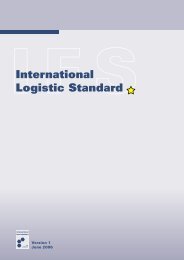
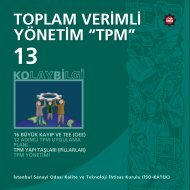
![Otomatik indirilmez ise tıklayınız [Download]](https://img.yumpu.com/44170525/1/190x190/otomatik-indirilmez-ise-taklayanaz-download.jpg?quality=85)
